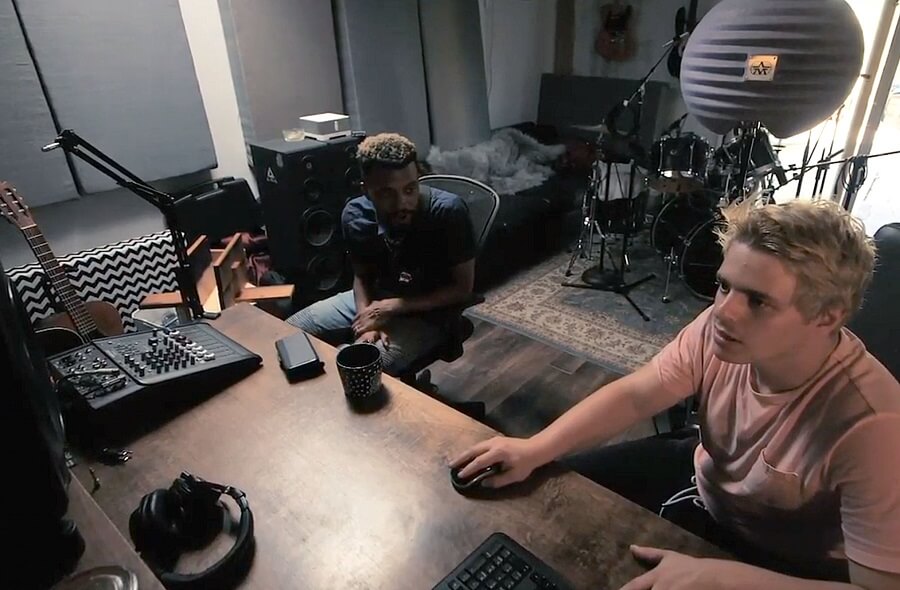
Recording Connection mentor producer/artist Lucas Abend
mentor Lucas Abend (Snoop Dogg, Lost Kings, Krewella) is an artist/producer who’s passionate about helping others get the tools, training, and advice they need to make great-sounding music, whether they’re pursuing a career in music or are looking to enrich their lives through musical expression. We connected with Lucas to learn more about how he trains aspiring music makers in a remote, one-on-one manner, allowing him to take students across the country. We also discussed the necessity of putting the ego on ice, the virtues of making “bad music” when you’re just starting out, and more!
In the past, you’ve stressed the point that making music and training with Recording Connection really is for anyone who wants to do it, not just younger people looking to become artists and producers.
“I’ve had students from all walks of life. I’ve had kids, 19, 18, 20, who are just coming up and they really love electronic music, and they’re trying to get into it. I’ve had doctors who are in their 40s, and they want a new thing in life that’s going to be able to give them that moment to create…. I’ve had producers who have been producing for six years, and they just want somebody to give them something to bounce off of. They want that critical feedback. They know that they can make a step further in their production quality, and so working with those people as well.
Really, it’s kind of for everybody, because it’s not just like a curriculum of like, ‘Well, if you already know these things, then this program isn’t for you,’ because it’s really more almost just about that critical feedback… about having someone who can show you a new perspective on how to approach being creative, how to approach producing with a high production value.”
Lucas shares his advice for learning music production in out Straight Talk video below!
Could you talk us through the nitty-gritty of what actually goes on when you’ve mentoring a student one-on-one remotely, through the computer?
“The kind of education that I’m doing right now with this remote stuff really was not possible even, like, I want to say five years ago…. I’m directly controlling and manipulating the student’s screen, but also hearing their computer audio at a high enough fidelity, where it’s not coming through their speakers. I can actually hear the output which really puts me in the room with them. And that way, we can both explore the sonics… in a high-enough fidelity where it’s actually usable. …
Instead of me just saying, ‘Oh, well. I don’t know how this sounds, but this is how you would do it.’ It’s like, we can actually get in [there], like, ‘This snare has too much mids, or low end,’ and we can discuss… the nuance (which is really quite nuanced), of production, sound quality, and all of that. So being able to essentially be right next to the student while we’re doing those one-on-one sessions is what makes this program special. …
There’s some great content on YouTube…. I encourage my students to still research that content, but there is no replacement for critical feedback, and there is no replacement for that one-on-one connection with someone who’s better than you. Working with people who are better than you is how you get better.”
What’s your advice to people who are musically inclined but aren’t experienced musicians? How can they stay committed to doing the work of learning and becoming music makers themselves?

Recording Connection mentor Lucas Abend in-studio with friend
“So much of creativity is about just getting out of your own way and really removing your expectations. The biggest thing that I see in my beginner students, and really even in my advanced students is their expectations of where they’re supposed to be, and how those expectations really just hold them back. …
If you have this expectation that the first thing that you’re going to make is this beautiful, incredible composition, and you’re going to be lauded as a prodigy, and this amazing person, like, ‘Oh, my god, they’re a genius to the world.’ If that’s what your expectation is, you’re going to be probably severely disappointed with your first results. …
Obviously, it’s great to be confident, it’s great to know that you have something to say. But… if you kind of step back from your own ego, you’re going to give yourself so much more creative room to just start to explore the tool. And whether it’s a guitar, or it’s Ableton, or it’s Pro Tools, or its Logic, or, you know, any of these artistic tools that we have for us, if you can just sit with them, and have fun with them, and push away those ideas of, like, ‘Oh, I’m going to be this great thing.’ … You have that drive… and that’s awesome. And that’s what gets you to the desk; that’s what gets you to pick up that guitar. But once that guitar is picked up, you got to chill on that ego, and you got to just let yourself explore and let yourself have fun.
And that’s how you, sort of, open up the idea of learning something new, and finding that voice for yourself is just by having fun with it. Because if you don’t have fun with it… you’re not going to want to do it, you’re never going to get the skills and the familiarity with the tool to really achieve where it is that you want to be.”
So many newbies start out on-fire, then get disillusioned and give up on themselves. That’s painful to witness. If only they would persevere! Any advice on that front?
“The Dunning-Kruger Effect is this concept where there is this peak of confidence that happens at the very, very beginning of learning something. So the people who know the least amount in a subject have the most amount of confidence. And then, as they realize that there’s more to it than they thought, that peak is called ‘Mount Stupid.’ And then there’s this dip in confidence, and that’s called ‘The Valley of Despair.’ And so, what happens is people see The Valley of Despair, and so they try and climb back up Mount Stupid…. They’re trying to stay comfortable with where they are and not go that extra distance past that valley to a point where you can be sustainable, and you have experience, and you actually understand, you know, ‘Well, this thing is complicated, but it’s also easy.’”
Exactly. One’s discomfort is usually a signal to lean in and learn, not to give up. Do you have a personal mantra that inspires you to make music or create?
“‘Make bad music.’ That’s a personal mantra for me…. Especially when I was a beginner, that’s how I got through that phase…. The only way you’re ever going to make good music is by making a lot of bad music. …
Obviously, in reality, we’re not
trying to make something bad. But if you come at it with that perspective, you’re going to be a little bit more resilient to something if it does end up being bad. Because if it does end up being bad, which it will at some point or another, it won’t, kill your ego. You’ll be like, “Hey, well, that’s what I was trying to do.’”
Do you get a sense of satisfaction from mentoring people?
“Definitely. A hundred percent. It’s great to see people grow. It’s really, really exciting to see someone who… never opened up Ableton before in their life, and then… even three months into the program… they’re creating these full beautiful compositions. It’s super rewarding.”
Learn more about
Recording Connection, for Audio Engineering & Music Production, Beat Making, EDM, Live Sound, Music Business, DJing, and more!
* * * * *



